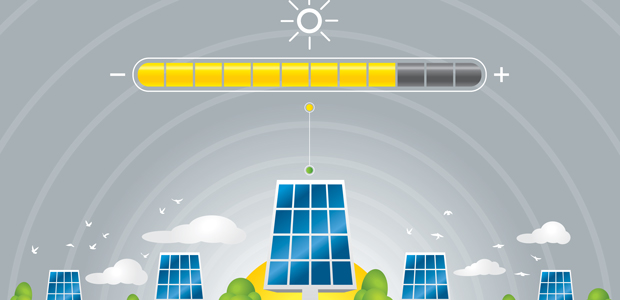
BODET TIME launches its Profil 930 L solar clock, a fully autonomous energy supply
As international leader in time display, time and audio systems synchronisation as well as energy price display, Bodet Time provides a true innovation by developing the first eco-designed solar clock: the Profil 930 L, an analogue clock providing a fully autonomous energy supply.
Designed to be installed in all types of facilities, this clock can be found in the education, transport, industry, health and community markets. This product is the result of the eco-design approach carried out by BODET industrial and family group in order to reduce the environmental impact of its activities.
In order to reduce the carbon impact of this clock throughout its life cycle (design, components, operation, recycling), the TIME activity of the BODET TIME & SPORT subsidiary (180 employees, turnover 2022: 27 M€) relied on the expertise of ASCA, the global leader in organic photovoltaics (OPV).
Wireless and without any batteries, the Profil 930 L clock is powered by an ASCA® solar solution, ensuring complete energy autonomy in artificial or natural lighting conditions, for at least 10 years.
From the first tower clock in 1868, to the first standalone solar clock
In 1868, Paul Bodet, craftsman and cabinetmaker, installed his first clock in the bell tower of the Trémentines church (France). Since then, five generations have succeeded at the head of the BODET group, international leader of time measurement and management. Within its TIME activity, BODET designs and manufactures made in France analogue and digital clocks installed in schools, healthcare facilities, industrial sites, train stations and airports. In 2022, more than 30,000 clocks have been sold worldwide.
Known for its many innovations, BODET TIME puts its experience to good use in its ecological approach. To assert its commitments to respecting the environment and reducing the impact of its activity and products, BODET TIME designed this brand new Profil 930 L clock, in an eco-design and circular economy approach.
Anthony Boigné, Product manager at BODET TIME, gives more information about the product: “We have considered all the possibilities in order to reduce the environmental impact of this clock, be it during the different steps of the manufacturing, during use, until its short-circuit recycling. Each component has been selected for its low carbon footprint while maintaining a high level of performance, free of rare metals and favouring some bio-based, recycled and reusable materials from our own production lines. The expertise of ASCA was decisive as it specifically met our specifications and allowed us to benefit from a renewable energy source thanks to organic photovoltaic cells. The completion of this approach is the first step and we want to keep using the energy harvesting process for our future products...”.
A fully eco-designed solution
All the electronic elements and materials which make up the Profil 930 L clock have been integrated in an eco-design and circular economy approach.
Light (0.8 kg), it is available in two colours (black and white), and its parts have been designed in recyclable and recycled thermoplastics. The wall and cell brackets are made of 100% recycled material from BODET TIME workshops, as is the material injected for creating the background of the black version of the clock. Eventually, the ASCA® organic photovoltaic solution integrated to the clock is completely recoverable and has no rare or toxic components. It also features a low carbon footprint.
From design to packaging, the Profil 930 L offers a virtuous solution. Indeed, the box used for packing the clock is made of recycled material and can be closed without using any adhesive tape. Plastics have been replaced by silk paper to ensure better protection of the product.
A solar clock providing a fully autonomous energy supply
The Profil 930 L analogue indoor clock from BODET TIME is powered by two ASCA® solar cells. Very light sensitive, the organic photovoltaic film designed by ASCA is particularly effective in low-light environments. It is also capable of generating energy in an indoor environment and under artificial lighting conditions such as in an office or in a hallway.
As such, the Profil 930 L is operational from 100 lux (corresponding to the European standard of minimum level of illumination to be maintained in an indoor circulation area such as an hallway in the workplace). Combined to the patented energy storage system from BODET TIME, the Profil 930 L clock operates without batteries, thus allowing the user to reduce waste, as well as logistics and maintenance costs that would be necessary to maintain or replace them. Last but not least, the Profil 930 L clock has a radio synchronisation (DHF). Therefore, no wiring is required, and it makes it compatible with all the DHF products from the BODET TIME range.
Innovation for the energy transition
Thanks to ASCA® photovoltaic modules, the Profil 930 L solar analogue clock from BODET TIME offers new, innovative and low-carbon time display solutions, at a time where the energy and ecological crisis is challenging our frame of reference.
“The International Energy Agency projects the stock of connected devices worldwide to increase from 20 billion to about 45 billion between 2020 and 2030 [1]. For their part, ADEME (The French Agency for Ecological Transition) and ARCEP (France’s Electronic Communications, Postal and Print media distribution Regulatory Authority) correlate the growth of the connected devices market with an increase of more than 200 TWh of additional consumption by 2025 worldwide [2]. As we are facing an energy crisis, it has become crucial to provide innovative solutions for the energy transition. At ASCA, we support manufacturers by developing tailor-made energy harvesting solutions that can be easily integrated to sustainably power all types of connected devices with ambient light without having to use any batteries. Rethinking the energy model is a tremendous vector of innovation, as illustrated by the eco-designed clock from BODET TIME”, concludes John Fiske, Business Development Manager at ASCA.

